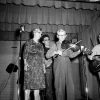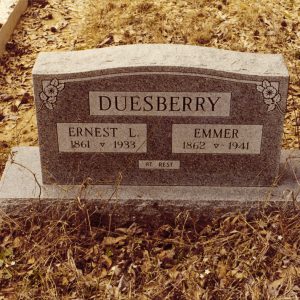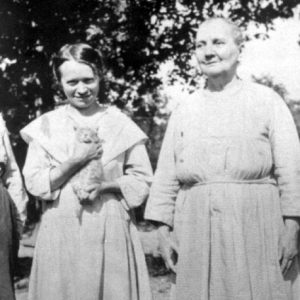calsfoundation@cals.org
Emma Hays Dusenbury (1862–1941)
Emma Hays Dusenbury was an outstanding traditional singer; her work is represented by some 116 songs in the nation’s leading folksong archive at the Library of Congress.
Emma Hays was born on January 9, 1862, probably in Habersham County or Rabun County, Georgia, to William Jasper Hays and Mary Jane Pitts. She came to Arkansas with her parents and four siblings in 1872, staying first in Crittenden County but eventually settling in Baxter County, near Gassville. Sometime after 1880, she married Ernest Dusenbury, who was from Illinois. Two years later, they had a daughter. In about 1894 or 1895, she suffered a serious illness that left her blind.
Before settling near Mena (Polk County) in about 1907, Dusenbury lived an itinerant life; her husband worked railroad and packing plant jobs, and the whole family picked cotton in the summers. Dusenbury’s husband died in 1933, leaving the family to live in poverty.
During the late 1920s and early 1930s, guided by F. M. Goodhue, a teacher at a nearby radical labor school, Commonwealth College, Dusenbury was recorded by some of the best-known folksong collectors in the region and nation. John Lomax, Vance Randolph (whose Ozark Folksongs lists November 1928 as the date of his first collecting from her), and Sidney Robertson all visited, as did poet John Gould Fletcher and Little Rock (Pulaski County) composer and symphony director Laurence Powell. All were greatly impressed; Lomax wrote in his autobiography that she sang continuously for two days and recorded more traditional Anglo-American ballads than any other singer.
Dusenbury’s one brush with celebrity came in 1936 when she sang in Little Rock as part of the celebration of Arkansas’s statehood centennial. Her photograph appeared in the newspaper, along with two feature articles about her (one written by Powell) that are even today the primary sources of information about her. Powell later based the final movement of his Second Symphony on three of her traditional songs.
Dusenbury’s repertoire was more than simply large—it was remarkably varied, including many rarely recorded songs in addition to the old Anglo-American ballads especially prized by the collectors of the period. “Abraham’s Proclamation,” for example, a scoffing number denouncing President Lincoln’s Emancipation Proclamation and believed by scholars to originate in blackface minstrelsy, has been collected from no other singer.
Dusenbury died on May 6, 1941; she is buried, as Emmer Duesberry, in the small community of Rocky (Polk County), near Mena.
For additional information:
Cochran, Robert. “‘All the Songs in the World’: The Story of Emma Dusenbury.” Arkansas Historical Quarterly 44 (Spring 1985): 3–15.
———. “Sweet Emma: Poor, Blind, and Illiterate, She May Have Been Our Greatest Folksinger.” Arkansas Times, November 1983, pp. 46–48.
Emma Dusenbury Folksong Collection. Special Collections. University of Arkansas Libraries, Fayetteville, Arkansas.
Robert B. Cochran
University of Arkansas, Fayetteville
This entry, originally published in Arkansas Biography: A Collection of Notable Lives, appears in the CALS Encyclopedia of Arkansas in an altered form. Arkansas Biography is available from the University of Arkansas Press.









Thank you with all my heart for this entry. I am listening to her sing. I am trying to pick up some chords uon my accoustic. Special thanks to Bob Cochran for any research on Emma.